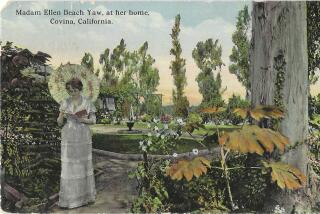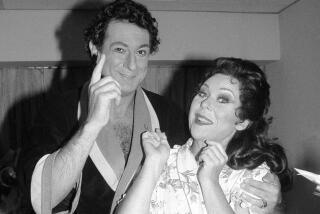Bidu Sayao; Opera Star of the 1930s and ‘40s
- Share via
Bidu Sayao, the coquettish operatic star of the 1930s and ‘40s whose lyrical soprano voice lent itself to concert halls and recording studios, died quietly and mostly forgotten Friday.
The Brazilian native, who became an enthusiastic citizen of the United States, was 94 when she died in a Rockport, Maine, hospital near her retirement home of Lincolnville. She had lived in that seacoast village since the late 1950s.
Associated Press quoted her caretaker, Jeff Smith, as saying that she had been in failing health since returning from a triumphant appearance at the Carnival parade in Rio de Janeiro in 1995.
A favored singer of the legendary Arturo Toscanini, the maestro took a personal interest in the then young lyric voice, coaching her for what was to be her U.S. debut at Carnegie Hall in 1934. Two years later she began a lengthy affiliation with the Metropolitan Opera, singing the title role in “Manon.”
Her musical journey began in her native Rio when she sang “little songs” around the house. In 1986, she told a Los Angeles Times interviewer that her mother encouraged her interest when she was in her teens and took her to a local teacher who opened up the world of bel canto for her.
After her Romanian-born teacher had her appear before Queen Marie of Romania, she and her mother went to Paris, where Bidu (the diminutive name for Balduina) studied under French tenor Jean de Reszke.
He soon had her singing Juliet at the Paris Opera and sent her on tour through Rome, where she sang Rosina in “The Barber of Seville” at age 18.
Next was La Scala, where her brilliant coloratura first attracted Toscanini.
Over the years she developed understated charm and warmth unique to the sopranos of her day and was rewarded lead roles in “La Boheme,” “La Traviata,” “I Puritani,” “Rigoletto” and dozens more.
She was a diminutive woman, perhaps more physically attractive and demur than her colleagues, and her seeming frailty lured her to lighter roles, which she later credited with prolonging her career.
In addition to her appearances on the world’s opera stages, Sayao made extensive concert tours, performing in 49 states. To show her gratitude for her adopted homeland, an effusive Sayao sang for wounded soldiers returning from World War II. She became a U.S. citizen in 1959 but maintained her Brazilian citizenship.
Brian Kellow, executive editor of Opera News, recalled Sayao as an impassioned singer whose recordings live on today--particularly her performances of Mozart.
“You put them on and you have to stop what you’re doing. You have to listen,” he said in a telephone interview from New York. “They don’t make good background music. They require your attention. They command it.”
Sayao was married to baritone Giuseppe Danise, who died in 1963. Her only survivor is a nephew in Brazil.
More to Read
The biggest entertainment stories
Get our big stories about Hollywood, film, television, music, arts, culture and more right in your inbox as soon as they publish.
You may occasionally receive promotional content from the Los Angeles Times.










